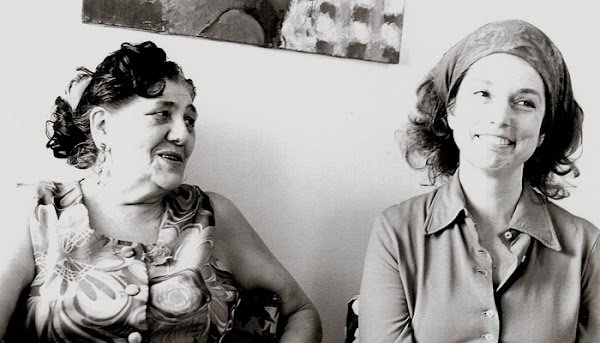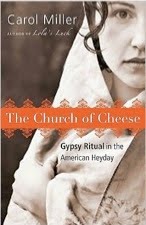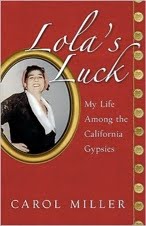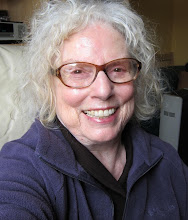Saturday, June 15, 2013
Two Parents Living, 1978
My father carries the heavy luggage, as he has always done, ignoring the wet mist of rain in his face and the puddles staining his shoes. He leads the way, hurrying mother by his urgency, projecting the sense of positive directions and insistent goals. They will spend twenty-one drowsy, dulling hours on the bus. But he will be the first in line, getting on, getting off.
He would have preferred to fly. But only a family emergency can get my mother on a plane. After a week of eating and over-eating at the recommended San Francisco restaurants, they are leaving, traveling back to Washington State the way they came, by Greyhound bus.
Turning away from the car, they deny my request to wait while I park and return to see them seated. "That isn't necessary," says my father brusquely, rejecting the sentiment of a lingering goodbye. And I know, from knowing him all my life, the irritation, should I insist, at the slightest implication that he has requested or required either comfort or solicitude, when he doesn't, he never has.
My role is to smile and wave and pretend I must hurry off to another appointment.
I note it is with increasing difficulty that my father stands tall, essaying the weight of two suitcases, a furled umbrella, and the invariable briefcase, holding fast to a graying grace through the awkwardness of double doors. He holds them impatiently for her, for my mother -- once a sunburned black-haired tomboy who still moves with an athlete's natural grace -- at his side and a step behind, seconding him, supporting his will and wishes in the style of that era, maternal, serene, attentive. I wonder, does she hope never to be first? He invariably leads the lead, our boss, paterfamilias, responsible for everything that might affect us, or him, and to the world for the public standing of everyone in his family.
I can't even imagine what it is to be a man of his time and responsible for such impossible tasks.
While he saw friends -- he has a gift for male friends -- mother and I who are close in mind and spirit walked together, looked in windows; we shopped, we shared practical advice about domestic affairs and conspiring giggles that echoed my childhood's long ago. Married fifty-some years, she is nervous now when Jack is not near, when he is walking the city alone, or meeting his buddies in places she doesn't know. Time has tempered my father's fierce command, the hunger for prizes and fame that once flared at his frightened children. But though he is more forgiving of failure, I know he will never approve of my current lifestyle, writing and living on a shoestring while doing fieldwork. When he says so, I am aware he is only stating a matter of principle, the Horatio Alger bid for monetary success that he has lived by. Still, hurt and dismay wells in my throat.
Harder and harder, each time, to watch them leave.
Much to learn from them and little time, about how to treat my own children and, of course, about who I am.
A crisis of contrary expectations dogs our generations. Mine is hippie; theirs spells accumulation as logo and material increase as legend. Father collects bonds, bank accounts; he manages the estates of vanished male friends and advises their widows. Mother collects children -- she had five -- genealogies, sagas of births, weddings, increase, reading me the names. The tree-chopping, city and highway building policies that pushed the country West and the theme of hard work, the expansionist American Dream, propelled them up a class. I have always had two mothers. One speaks for father and most likely herself, protesting the present sons-in-law and the previous sons-in law. Weak men, she says, poor providers, too young for my sisters and I, too artistic, too much hair, not enough discipline, not enough -- as is unspoken but obvious -- like father. While I helped her into her jacket, however, the other smiled and whispered "Have fun," gifting me with the convivial advice that speaks of her own unfettered and happy childhood, running and climbing through a wild of woods and fields.
Born into the middle-class, I don't feel any urgent need to 'make it' or 'succeed.' I do want to 'help,' however, and became an anthropologist for that reason.
My own mortality is foretold in those straight, unrelenting backs and the heads that won't look back. If we were Gypsies, we could cry, holding and together for a time. Instead, I am left with their tears and mine to shed, saddened at the thought of their eventual separation, for the one of them that will be left behind, and for myself, who always is.
Friday, June 14, 2013
Mill Valley, 1989
Once I lived in Mill Valley. Mornings, I wrote and, after lunch, walked to the Book Depot in the middle of town for the company and coffee. Afternoons, I often took another walk among the coastal redwoods, and sometimes into the hills. At various spots and high enough, I could see the ocean, Sausalito, San Francisco.
On one of these hikes, I met a dark-haired young man wearing a brilliantly tie-dyed t-shirt. Life with the Machvaia Roma had taught me to share my thoughts and I immediately confessed his shirt struck me as knockout. He asked if I were a Deadhead -- Marin was full of Deadheads. Deadhead music had never appealed to me and I said so. Nevertheless, he peeled off the shirt which he had acquired at a Deadhead concert. "Here, you like it, you keep it," he jauntily said and continued on his way.
I treasured his gift, mostly for the manner of the giving. Then, after a year or so, I immediately gave it to someone I didn't know who admired it in passing.
Giving is an art and a practice. Giving can be practiced as an art.
Subscribe to:
Posts (Atom)



